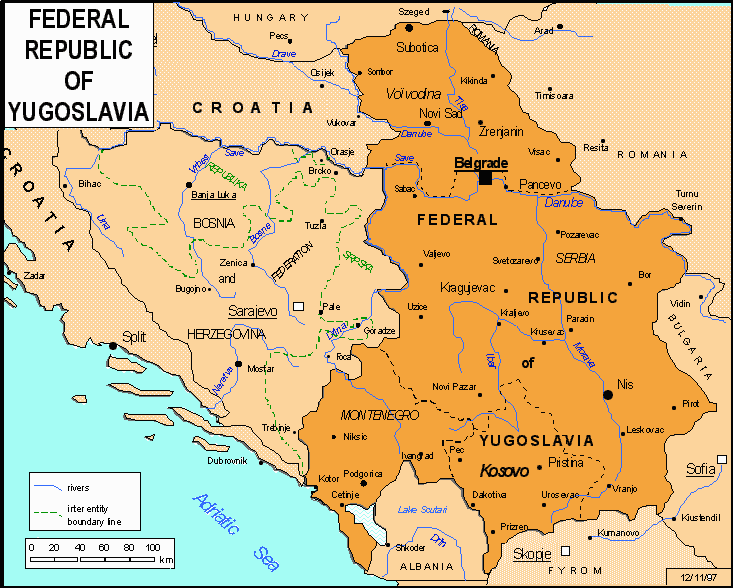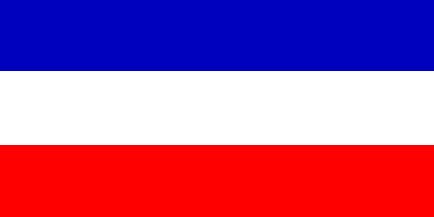




During 1997 the international community continued to work intensively to implement the Dayton Accords, a step-by-step process designed to end the war in Bosnia and secure the peace. United Nations (UN) sanctions against the "Federal Republic of Yugoslavia" (FRY) were formally lifted in 1996. A US-supported "Outer Wall" of sanctions, which precludes the FRY from joining International Organizations and International Financial Institutions (IFIs) such as the UN and the International Monetary Fund (IMF), remains in place pending progress on a range of political issues. The US Government has refused to extend diplomatic recognition to the FRY as an additional condition of the "Outer Wall." The conditions for removal of the "Outer Wall" are: improvement of the human rights situation in Kosovo; cooperation with the International War Crimes Tribunal in the Hague; and progress in the resolution of the succession and continuity issues associated with the dissolution of the SFRY.
The disintegration of the SFRY created a variety of economic problems for Serbia and Montenegro (FRY). The combined effects of market disruption, war, UN trade sanctions and poor economic policy choices led to hyperinflation in 1993 and a reversal of the economic transformation which had begun in 1989. Industrial production was devastated and, despite recent growth, GDP per capita is currently only half of its 1989 level. GDP growth has been hobbled by the lack of economic reform and by the effects of the US-supported "Outer Wall" of sanctions After the disintegration of the SFRY, on April 27, 1992, Serbia and Montenegro joined to constitute the FRY. The constitution of the FRY established a parliamentary system, with a relatively weak presidency. The FRY Parliament is composed of: the Chamber of Citizens (138 deputies) and the Chamber of Republics (40 deputies -- 20 from each republic).In practical terms, political power in the FRY is concentrated within the ranks of the Serbian Socialist Party (SPS) and the Democratic Party of Socialists (DPS), the ruling parties within Serbia and Montenegro, respectively. These parties, the heirs to the League of Communists of the SFRY, hold majorities in both federal houses. The DPS holds a strong majority in Montenegro. In Serbia, the SPS, together with New Democracy, a junior coalition partner, holds a majority in the parliament. The Serbian Renewal Movement (SPO) of Vuk Draskovic, which has 25 representatives in the 250-seat Serbian legislature, has strongly criticized the government over the growing international isolation of the Serbia due to the crisis in Kosovo. Yugoslav Leftists [JUL] is a political organization created and led by Mirjana Markovic, the wife of president Milosevic. Its is supported mostly by extreme leftists, and it has immense influence on most state institutions. Government control over the media has hamstrung political opposition parties and has also largely nullified pressure for greater democratization. Strong government influence has also weakened the nominally independent judiciary.
Three leading opposition parties -- the Serbian Renewal Movement, the Democratic Party and the Civic Alliance -- formed a coalition, Zajedno, and won the November 17, 1996 round of local elections in most of the major cities in Serbia. The Serbian government attempted to annul this victory until February 1996, when, following three months of demonstrations and international pressure, opposition victories were finally recognized. The opposition coalition has since collapsed at the national level, although it continues to function in local governments throughout Serbia.
Serbia-Montenegro is dominated by Slobodan Milosevic who, after two terms as President of Serbia, became Federal President in July 1997. President Milosevic continues to control the country through his role as President of the Socialist Party of Serbia -- a dual role arrangement proscribed by the federal Constitution -- and his domination of other formal and informal institutions. Although the SPS lacks majorities in both the Federal and Serbian Parliaments, it controls governing coalitions and holds the key administrative positions. Serbia abolished the political autonomy of Kosovo and Vojvodina in 1990, and all significant decisionmaking since that time has been centralized under Milosevic in Belgrade. The Milosevic regime effectively controls the judiciary and has used this power to manipulate the election process, most notably to reverse opposition victories in Serbian municipal elections over the winter of 1996-97--an effort that the regime abandoned in February after sustained domestic and international pressure.
As a key element of his hold on power, President Milosevic effectively controls the Serbian police, a heavily armed force of over 100,000 that is responsible for internal security. After his move to the Federal presidency, Milosevic precipitated a crisis when he tried to wrest control of the Montenegrin police from Montenegrin Prime Minister Milo Djukanovic. Serbian police committed extensive and systematic human rights abuses.
Despite the suspension of UN sanctions, economic performance has been anemic. Unemployment and underemployment remained high as the Government was unable or unwilling to introduce necessary restructuring measures. The Government has not implemented sweeping economic reforms, including privatization, which could undermine the regime's crony system. Largely as a result of the central bank's tight monetary policy and the partial selloff of the state telecommunications entity, inflationary pressures were kept relatively in check.
The Government's human rights record continued to be poor. The police committed numerous, serious abuses including extrajudicial killings, torture, brutal beatings, and arbitrary arrests. Police repression continued to be directed against ethnic minorities, and police committed the most widespread and worst abuses against Kosovo's 90-percent ethnic Albanian population. Police repression was also directed against the Muslims of Sandzak and detainees and citizens who protested against the Government. While under the Constitution citizens have a right to stage peaceful demonstrations, the police seriously beat scores of protesters throughout the country, sending many to hospitals. The Government used its continued domination of Parliament and the media to enact legislation to manipulate the electoral process. In practice citizens cannot exercise the right to change their government. The judicial system is not independent of the Government and does not ensure fair trials. The authorities infringe on citizens' right to privacy. The Government used police and economic pressure against the independent press and media and restricted freedom of assembly and association. The Government infringed on freedom to worship by minority religions and on freedom of movement. The Government continues to hinder international and local human rights groups and reject their findings. Discrimination and violence against women remained serious problems. Discrimination against ethnic Albanian, Muslim, and Romani minorities continues. The regime limits unions not affiliated with the Government in their attempts to advance worker rights.
As a signatory of the Dayton Accords, Serbia-Montenegro is obliged to cooperate fully with the International Criminal Tribunal for the Former Yugoslavia by turning over to the Tribunal the five persons on its territory who were indicted for war crimes. The Government has so far been uncooperative. According to credible reports, some of those indicted live in Serbia, and others freely travel in and out of Serbia. Over the summer, suspected war criminal Ratko Mladic vacationed in Montenegro and earlier, according to press reports, attended his son's well-publicized wedding ceremony in Belgrade.
A number of independent human rights organizations exist in Serbia-Montenegro, researching and gathering information on abuses, and publicizing such cases. The Belgrade-based Humanitarian Law Center and Center for Antiwar Action researches human rights abuses throughout Serbia-Montenegro and, on occasion, elsewhere in the former Yugoslavia. The Belgrade-based Helsinki Committee publishes studies on human rights issues and cooperates with the Pristina-based Helsinki Committee in monitoring human rights abuses in Kosovo. In Kosovo the Council for the Defense of Human Rights and Freedoms collects and collates data on human rights abuses and publishes newsletters. In the Sandzak region, two similar committees monitor abuses against the local Muslim population and produce comprehensive reports.
